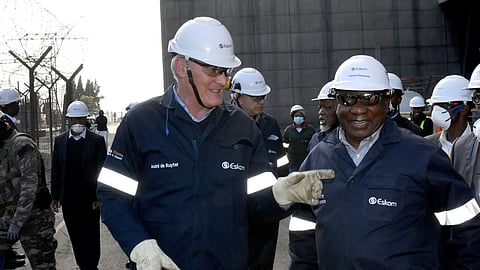Eskom’s ludicrous expenditure: R238,000 for a mop – de Ruyter
In his revealing new book, "Truth to Power: My Three Years Inside Eskom," former Eskom CEO Andre de Ruyter unveils a staggering web of corruption at Eskom, detailing how the power company became an enticing target during the state capture era under former President Jacob Zuma. De Ruyter explains how the Gupta family, in one audacious scheme, attempted to capture the Optimum colliery, aided by Eskom's board, which approved financial assistance exceeding R2 billion. His book also exposes a governance vacuum, highlighting the complicity of board members and the widespread abuse of power that permeated the company, from overpriced toilet paper to exorbitantly charged kneepads.
Eskom paid R934,950 for kneepads and R238,000 for a mop — De Ruyter
Former Eskom CEO Eskom Andre de Ruyter lifted the lid on widespread fraud and corruption at the state utility in his new book, Truth to Power: My Three Years Inside Eskom.
In this book, De Ruyter gives a behind-the-scenes look at how Eskom was crippled by corruption on a staggering scale.
He said Eskom was an attractive target under former President Jacob Zuma during the state capture era because of its huge procurement bill.
Eskom has a procurement bill north of R140 billion per annum and a capital expenditure budget exceeding R35 billion. The opportunities for looting were everywhere.
The Gupta family saw a great opportunity and executed one of their most audacious schemes through the attempted capture of the Optimum colliery.
Astoundingly, Eskom's board voted to aid the Guptas in their endeavour by rubber-stamping financial assistance of more than R2 billion.
"I was struck by the sheer sense of normality that had been created as if these egregious acts were entirely within the normal course of Eskom's business," De Ruyter said.
"Board members displayed neither outrage nor courage. They didn't question these decisions and were only too happy to acquiesce in criminal acts."
It quickly became clear that it was open season at Eskom, and many employees, ably abetted by contractors and suppliers, gorged themselves.
"In the governance vacuum created by the Zuma years, the floodgates were open to all and sundry to get their moment at the trough," De Ruyter said.
At Eskom, no item was too small to serve as a conduit for the looting, even a humble single-ply roll of toilet paper.
De Ruyter listed numerous examples where fraud and corruption cost the power utility lots of money.
- Eskom paid R26 for a single-ply roll of toilet paper which cost R5 – a 420% markup.
- Eskom paid R51 for a black refuse bag, which retailed for R2.99.
- Eskom ordered a mop for R238,000.
- Eskom paid R80,000 for knee pads which cost R150 at Builders Warehouse.
- One kneepad supplier paid R4,025 and charged Eskom R934,950.
"It soon became clear to me that our chief procurement officer, Solly Tshitangano, was completely out of his depth," De Ruyter said.
"On his watch, less than 35% of items were purchased according to contract. The rest was free text on the vendor software system SAP where you could type in any amount you wanted."
"By bypassing Solly, I would eventually manage to push the figure of 35% up to 95%."
De Ruyter tackled the issue and got senior management involved. He held weekly meetings to ensure it is taken seriously.
Read more: Truth to Power: A harsh wake up call – Katzenellenbogen on de Ruyter
Chris Baloyi, Eskom's new head of forensic investigations, phoned the kneepad suppliers. The response was surprising.
- Within 24 hours, one supplier returned nearly R1.2 million to Eskom. They had not even delivered his overpriced kneepads, and the company's sole director was a relative of an Eskom employee.
- The second supplier had also been paid over R1 million for stock that was never delivered.
- The third provided an invoice for her own procurement of the kneepads. She had paid R4,025 and charged Eskom R934,950. This supplier admitted she overcharged Eskom.
They also laid criminal charges aside from pushing to recover money from suppliers who overcharged Eskom. De Ruyter wanted to see arrests.
However, it soon became clear prosecuting criminals who stole from Eskom was easier said than done.
Read more: Political analyst Eugene Brink: The toxic break up between de Ruyter and the ANC over Eskom
One suspect, a contractor working in the procurement department, was arrested and loaded into the back of a waiting police van.
De Ruyter thought he scored a victory against crime and corruption, but his sense of achievement was short-lived.
Soon after the arrest, he received a message from Karen Pillay, Eskom's head of security, informing him that the suspect had been released by the police 'on the instructions of a senior police officer'.
"I was outraged – and this was not to be the last time that Eskom's efforts to bring crooks to book were thwarted by apparently inexplicable police actions," he said.
Read also:
- Eskom in Pictures: No denying ANC's blame. Corruption or incompetence?
- Why loadshedding is only getting worse
- SARS Whistleblower JvL: De Ruyter's 'naive' investigation; Pravin Gordhan; being mugged
This article was originally published by Daily Investor and is republished with permission

